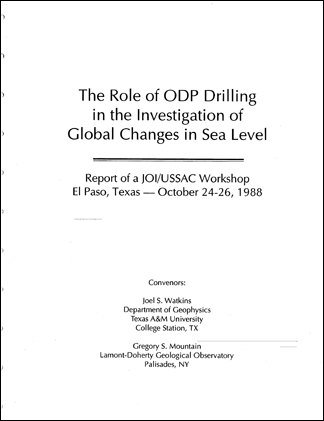Role of ODP Drilling in the Investigation of Global Changes in Sea Level
October 24-26, 1988 – El Paso, Texas
Convener: Greg Mountain, Joel Watkins

Summary
Global sea-level changes affect climate, ocean chemistry, ocean circulation, floral and faunal boundaries, biologic evolution, sediment deposition, global ice budgets and distribution of mineral and petroleum resources. Few phenomena in the earth sciences are as ubiquitous and pervasive in environmental processes.
Marine sediments record effects, proxies and linkages of global sea-level change that range from the obvious, such as erosion of continental shelves during sea-level lowstands, to the subtle, such as minute changes in ocean chemistry. The nature of the earth’s response to sea-level change varies: shelfal clastic sediments respond with altered depostional patters; shelfal and atoll carbonate sediments respond with increasing growth during highstands, and with dissolution and chemical alteration during lowstands; deep-sea sediments respond with changes in chemical and biological proxies filtered through effects of ocean circulation, climate and ocean chemistry. Ocean drilling is critical to the investigation of sea-level change as it constitutes our only tool capable of adequately investigating this diversity of response. The workshop identified principal objectives, targeted time intervals for detailed study, and suggested a drilling strategy.
Workshop Report (pdf)
Organizing Committee
Joel Watkins, Texas A&M University
Gregory Mountain, Lamont-Doherty Geological Observatory






